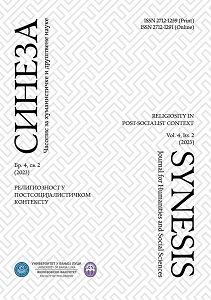Утицај религије на обликовање српског националног идентитета у Босни и Херцеговини
The influence of religion on the formation of Serbian national identity in Bosnia and Herzegovina
Author(s): Borivoje MiloševićSubject(s): Inter-Ethnic Relations, Sociology of Religion, Identity of Collectives
Published by: Filozofski fakultet, Univerzitet u Banjoj Luci
Keywords: Religion; national identities; Bosnia and Herzegovina; Serbs;
Summary/Abstract: Serbian national identity was shaped by many factors, among which the most important are: language, alphabet, state-legal tradition and religion. Many authors emphasize the predominance of religion in the array of other identity characteristics of all Balkan peoples, including the Serbs. The period of Ottoman rule is of key importance for understanding inter-ethnic relations in Bosnia and Herzegovina. That area, along with parts of the Albanian, Macedonian and Bulgarian territory, is the most deeply Islamized compared to other parts of the European continent conquered by the Turks. Islamization caused the gradual penetration of Islamic culture and customs in Bosnia and Herzegovina. The geopolitical position of the provinces, on the borders of great civilizations and cultures, and then two empires, Ottoman and Austro-Hungarian, additionally influenced the complexity of religious situations and the influence of religion on the formation of modern national identities. The national and religious segmentation of society in Bosnia and Herzegovina has left a deep mark on political organization as well, which we can trace back to the beginning of the 20th century when the earliest political parties were founded during the Austro-Hungarian administration. The wars that ravaged the territory of Bosnia and Herzegovina throughout the 20th century had a pronounced religious character.
Journal: Sineza
- Issue Year: 4/2023
- Issue No: 2
- Page Range: 43-58
- Page Count: 16
- Language: Serbian

